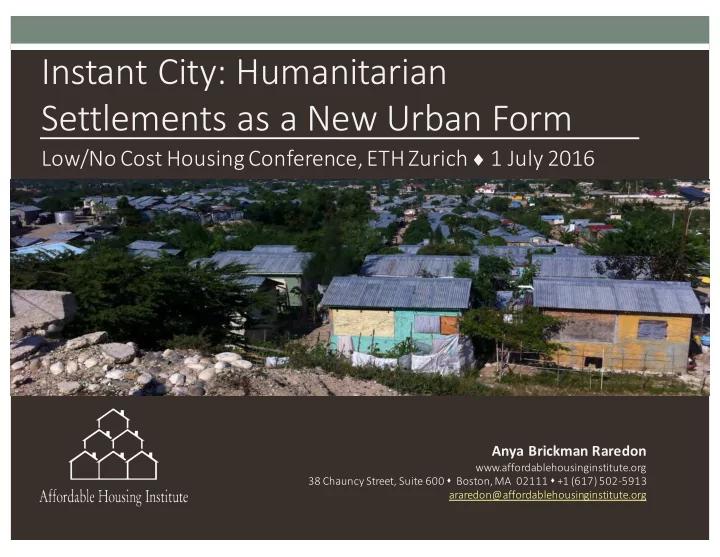

Instant City: Humanitarian Settlements as a New Urban Form Low/No Cost Housing Conference, ETH Zurich ♦ 1 July 2016 Anya Brickman Raredon www.affordablehousinginstitute.org 38 Chauncy Street, Suite 600 s Boston, MA 02111 s +1 (617) 502-5913 araredon@affordablehousinginstitute.org
Shelter Camp or Instant City? § Over 50 million displaced people worldwide § Major protracted refugee situations average 14-17 years § Many shorter refugee or IDP situations last as long as 5-6 Source: British Foreign & Commonwealth Office years. § Can we call this temporary? § What happens when we do? § What happens if we don’t? 1-Jul-16 Affordable Housing Institute 2
Current Planning: Camps § Planned for low-density, single- purpose activities § Assumes universality of basic human needs and activities § Assumes that technically and neutrally planned space will result in stable and hygienic living because they are “easy” for international organizations to set-up and manage. 1-Jul-16 Affordable Housing Institute 3
Refugee Camp as a Heterotopia § Camps bring together seemingly incompatible activities, and have strictly controlled access. § They are marginal spaces, both physically and politically. § Length of tenure reinforces the segregation and limitation for those residing within. 1-Jul-16 Affordable Housing Institute 4
Heterotopia: Consequences § Individuals are shaped by the space and environments that they inhabit § Exclusion has economic, social, and political consequences § Reinforces the absence of territorial citizenship among residents of refugee camps § Bounded by physical and economic barriers, protracted residence leads to either protracted dependence or the growth of slums 1-Jul-16 Affordable Housing Institute 5
A New Lens: Instant City Growth of a community August 2010 January 2010 April 2013 November 2014 Affordable Housing Institute
Instant City – Key Ideas § Displacement is a continuum of time, agency, and capital, rather than a temporary state. § The displaced – rather than being relegated to mere ‘beneficiaries’ or actors without agency – represent untapped potential and resources, which can be leveraged in activities across the spectrum of response-recovery-reconstruction, even in contexts different from those in which they were created. § Immigrants, many of whom were once refugees, have historically assimilated into being productive contributors to the economic, social, cultural, and institutional dimensions of societies. Affordable Housing Institute
Analysis and Case Studies Mapping the permanence of camps according to 8 key characteristics. Mapping physical change of long-term camps against original location. 1-Jul-16 Affordable Housing Institute 8
Jordan: spatial flexibility and regional economy § Camps transform into cities and interact with the regional socio-political environment – whether sanctioned or not. § Families reorganize their caravans into courtyard configurations that reflect the communities that they fled. § Economic turnover in Zaatari at the end of 2013 was estimated at $11.3 million per month. Largely informal, but impactful. § Integrated with local economy despite the physical isolation – donated goods smuggled out and sold in neighboring towns. 1-Jul-16 Affordable Housing Institute 9
Haiti: accessing finance, facilitating permanence § Planned to transform a formal IDP camp on government land into a permanent neighborhood. § The goal was to provide permanent homes and a replicable model for low- and informal-income home financing. § ~1500 families in the camp, pilot phase was intended to produce 125 houses. § Designed a cooperative management structure for residents to take on debt and manage property. § Designed a financial model that fit the needs and ability to pay of the current residents, and was commercially viable. 1-Jul-16 Affordable Housing Institute 10
Philippines: planning for permanence § Relocation of a vulnerable community after Typhoon Haiyan. § Community identified a site available for purchase. § Designed a cooperative governance structure and installment based financial structure for individuals to purchase the land. § Physical planning included commercial and programmed community spaces. 1-Jul-16 Affordable Housing Institute 11
Shifting from relief to city-building Establish humanitarian settlements that are intended to function as cities, with § the infrastructure, economics, and social conditions. Stop thinking solely about humanitarian relief – start building Instant Cities. Include city planners and urban development experts in the design and § development of these settlements Leverage refugee skills, assets (financial/material/intellectual), and motivation - § give agency to the displaced to improve their surroundings and engage in productive activities. Will increase safety and security in the settlement and the surrounding region. § Will allow residents to build equity and regain a sense of normalcy. § Will create a better quality of life during displacement, stronger communities, § and more sustainable solutions. City-building requires shifting the goals and horizons § § From short term → long term § From exit strategy → we’re a permanent community § From free tents/caravans → investments in housing and infrastructure Affordable Housing Institute
Today’s Refugees, Tomorrow’s Citizens § They are accelerated immigrants. § They are building cities, and changing their new countries. § The difference is housing, community, opportunity and acceptance. Affordable Housing Institute
Instant City: Humanitarian Settlements as a New Urban Form Low/No Cost Housing Conference, ETH Zurich ♦ 1 July 2016 Anya Brickman Raredon www.affordablehousinginstitute.org 38 Chauncy Street, Suite 600 s Boston, MA 02111 s +1 (617) 502-5913 araredon@affordablehousinginstitute.org
Recommend
More recommend